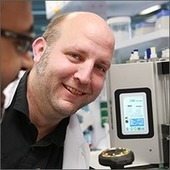Stem cells are unspecialised cells that can develop into any type of cell in the human body. So far, however, scientists only partially understand how the body controls the fate of these all-rounders, and what factors decide whether a stem cell will differentiate, for example, into a blood, liver or nerve cell.
Researchers from the Luxembourg Centre for Systems Biomedicine (LCSB) of the University of Luxembourg and an international team have now identified an ingenious mechanism by which the body orchestrates the regeneration of red and white blood cells from progenitor cells. “This finding can help us to improve stem cell therapy in future,” says Dr. Alexander Skupin, head of the Integrative Cell Signalling group of LCSB. The LCSB team has published its results in the scientific journal PLOS Biology.
Although all cells in an organism carry the same genetic blueprints – the same DNA – some of them act as blood or bone cells, for example, while others function as nerve or skin cells. Researchers already understand quite well how individual cells work. But how an organism is able to create such a diversity of cells from the same genetic template and how it manages to relocate them to wherever they are needed in the body is still largely unknown.
In order to learn more about this process, Alexander Skupin and his team treated blood stem cells from mice with growth hormones and then watched closely how these progenitor cells behaved during their differentiation into white or red blood cells.
The researchers observed that the cells’ transformation does not occur in linear, targeted fashion, but rather more opportunistically. Each progenitor cell adapts to the needs of its environment and integrates itself into the body where new cells are needed. “So, it is not as though the cell takes a ticket at the beginning of its differentiation and then travels straight to its destination. Rather, it gets off frequently to look around and see which line is best to take,” Alexander Skupin explains.
Learn more / En savoir plus / Mehr erfahren:
http://www.scoop.it/t/luxembourg-europe/?&tag=University+Luxembourg







 Your new post is loading...
Your new post is loading...































Learn more / En savoir plus / Mehr erfahren:
http://www.scoop.it/t/luxembourg-europe/?&tag=University+Luxembourg